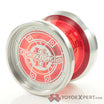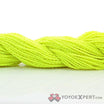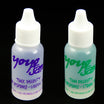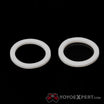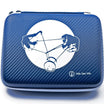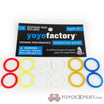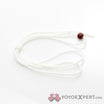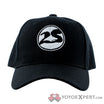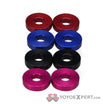Hello,
I remembear hearing that you don´t have to lube ceramic bearings.
Is that true?
That is correct.
tbf you don’t have to lube any bearings, esp unresponsive ones
Yeah, I’ve actually stopped trying to lube them. Even if I put the smallest spec of lube it makes them responsive for more time than I’d like. I tested it out one time and played the yoyo for months and it never broke in… maybe it’s the lube I’m using but I prefer to just keep my bearings dry. Only bearings I lube now are responsive bearings. Bearings are cheap enough, I’ve been playing pretty hardcore for a year now and I haven’t had a bearing go bad due to lack of lube yet and if/when that does happen, I’ll just replace them. I have more bearings than I’ll likely ever need and still I find myself wanting to buy more… it’s a problem I have.
What kind of lube are you using? Just bc I’m curious
FWIW I had this experience with V4M, but to be fair I was playing outside and it was below 40 degrees. The whole yo-yo was seized together until it warmed up.
I hate getting froze up.
I mix the yotricks lube down 50/50 with mineral spirit. And then spin em with pressurised air so it’s near dry.
That stops mine seizing up now that it’s freezing in the UK.
I usually just skip it. I only tried because the yo-yo was big, with thin walls and thus particularly noisy.
You had lube not break in for months? Was the yoyo in the cold that entire time? Months just seemed like a very long time and I was curious.
I am team lube for sure bc I prefer them quieter. idc what other people do with their gear tho tbh and for OP, I did also hear that ceramic bearings shouldn’t be lubed but haven’t tried any ceramic bearings.
Not months in my case. It was unresponsive within a few minutes, but responsive again way sooner than w/o any lubrication.
Yh. Im not too afraid of the noise now, im a big fan of ceramic bearings!
But for some reason, I like my OD 10s to be silennnnt
Édit: I was sprouting nonsense. I meant to say mineral spirit (white spirit) not acetone.
I am confused.
You mix Lube (Mineral oil, YoYo-Lube) and solvent (white spirit, acetone)?
Well, maybe I, as a former Bike-Mechanic-Trainee, lost some of my “wisdom”, but that seems to be pointless(?). Either the solvent washes the lube off = No lubrication or corrosion protection, or the lube remains in the creases, where the solvent did not fully act = also dryness. Or it is like when you diesel a part where the oil in the diesel lubes the part and the octane cleans of grease, which usually ends by the solution drawing water from weather or the air and you get a bearing with a nice brown oxide sludge.
I am lost. Please explain.
Mentioning acetone was a mistake, I use that to clean bearings generally.
I mix white spirit with thin lube. It essential dilutes the lube. Making it very thin. really recommend you try it out ![]()
It seems like dark magic and a deal with satan. But hey, I am not to proud to be wrong (and learn).
I have all that stuff on hand, so I will try it.
And thanks for the idea of using mineraloil. I have tons of that stuff for my bike-repairs.
In a pinch to get my Yo responsive, I used Ballistol. Which is great for small stuff and it does not age, but after that I was not a 100% sure if it is plastic friendly. My Yo is polycarb. Never had problems with it, but a softer solution would ease my mind.
Which mineraloil fixes perfectly because it is rubber protective, which should do the trick for plastic too.
Careful with mineral oil. It might just make it responsive if it’s not thinned out. idk the weight of ineral oil. Thick lube is for responsive, and thin is for unresponsive. Too much (in my experience, a medium sized as opposed to tiny drop) makes em go responsive.
It’s not necessary, really. But as henry said it makes them quieter. And never lube a ceramic.
Wash metal bearings with acetone or mineral spirits if you can find it, and wash ceramic with soap and water. Always spin dry. Compressed air is your friend.
Ive typed too many words again so I’ll stop
Sorry, me again.
Does the responsiveness of a Yo not come from the speed of its rotation? Thinner lube let’s it rotate faster, so it responds quicker to slack in the string? Or what does the lube actually do to make a Yo more responsive, exactly? Whats the mechanism behind it?
Or is it, that when the string gets slack, the lubed bearing has more friction inside, do to added material (lube), which makes it rotate quicker/more when the pull on the bearing loosens, as the string gets slack, which bunches the string in the channel quicker/more and mobilizes the Yo to rotate and wind up?
i’m not sure i understand what you’re saying tbh
and i don’t know if this is right either, but lube doesn’t really speed the bearings up, it just protects them. so more material (thicker lube, too much lube) ends up slowing the bearings down, which causes the yoyo to begin to wind up when the string catches the response
but really i have no idea. but in my head that’s how it works. either way, too much or too thick makes em responsive. none at all just makes them louder and theoretically wear out faster
it’s the latter
which makes it rotate quicker/more when the pull on the bearing loosens
this part is inaccurate, though. the bearing doesn’t rotate faster – it’s actually quite slower. so any extra slack in the system allows the string to wrap around the bearing and cause it to almost stop completely, bringing the yoyo up. the silicone response rings on the sides of the yoyo further help with this grip
a fully responsive yoyo can come up with a simple tug because the bearing is much slower and the tiniest bit of slack is enough to stop the bearing and cause the string to catch
I know bearings mostly from bicycles. And there they are all greased. Which is thick. Which makes the bike roll faster. But it’s also completely a different system of physics.
And lube makes them slippery, which reduces rolling resistance, which should in theory make it rotate faster. And if you apply thinner lube, the lube can move faster out of the way of the bearing-balls, which should make the resistance even less. No?
What makes the responsiveness? You tell me? Well you already did. So. Thanks.
But for me that means that I am looking for thicker lube, not thinner, as I want my Yo responsive.
Cool. Finally an answer!
But there are probably induced effects, like a Yo with thicker lube will spin less long due to the added friction. Is that right?
For the last year to get quite bearings I’ve been using 1/2 of a drop of Bones Speed Cream, after I blow them out with compressed air.
Noticed StaticCo using this during a Sudo Drop post and those always play great out of the box
De-shield of course
